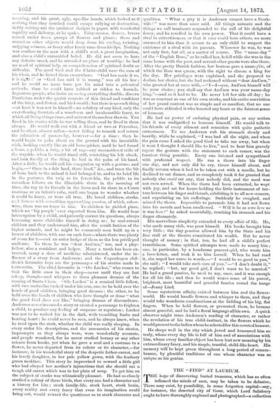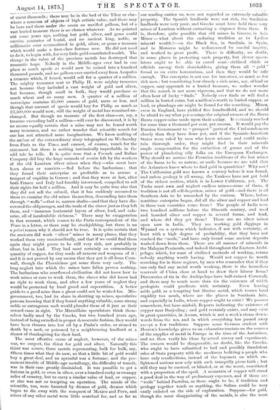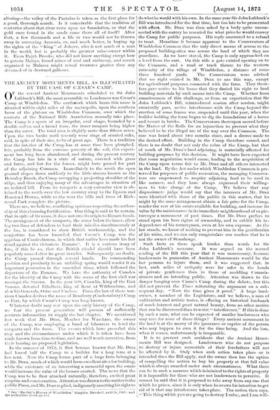THE "FIND" AT LAURIUM.
MHE hope of discovering buried treasures, which has so often inflamed the minds of men, may be taken to be delusive.. There may exist, by possibility, in some forgotten capital—sax., for instance, the deserted city of Gour, which Lord Salisbury ought to have thoroughly explored and photographed—a collection
where a museum of objects of high artistic value, and there may be here and there under the ocean an unrifled galleon, but of a vast buried treasure there is no chance whatever. As we pointed out some years ago, nothing but gold, silver, and gems could survive centuries of burial, and no ancient king, noble, or millionaire ever accumulated in gold, silver, or gems a treasure which would make a first-class fortune now. Ile did not need to do it, to begin with, for very little gold constituted wealth. The change in the value of the precious metals has destroyed that romantic hope. Nobody in the Middle-ages ever had in one place as much specie as would now be coined into a hundred thousand pounds, and no galleon ever carried away from Acapulco a treasure which, if found, would sell for a quarter of a million. The mighty treasures sent to Philip II. were mighty treasures not because they included a vast weight of gold and silver, but because, though small in bulk, they would purchase so much wheat and so many men. A quarter of a million of sovereigns contains 65,000 ounces of gold, more or less, and though that amount of specie would buy for Philip as much as £3,500,000 would now, still the weight of metal has remained un- changed. But though no treasure of the first class—or, say, a treasure exceeding half a million—will ever be discovered, it is by no means equally certain that a mine may not be found worth many treasures, and we rather wonder that scientific search for one has not attracted more imaginations. We know nothing of the author of the extraordinary story telegraphed on Wednesday from Paris to the Times, and cannot, of course, vouch for the statement, but there is nothing intrinsically improbable in the odd tale he tells. It is quite- true that a French and Italian Company did buy the huge mounds of scorim left by the workers of the old Laurium silver mines when they—who must have been slaves or convicts —fled before the barbarians ; that they found their enterprise so profitable as to arouse a tempest of cupidity in Greece ; and that they were at last, after both France and Italy had forcibly intervened, compelled to sell their rights for half a million. And it may be quite true also that they did not sell the subsoil, that it has suddenly occurred to them to examine the old mines themselves, descending into them through "wells"—that is, narrow shafts—and that they have dis- covered the oldpassages, and the tools of the slaves just as they left them, and "immense horizontal layers of silver, lead, and cala- mine, all of incalculable richness." There may be exaggeration in that account, which comes to the Paris correspondent of the Times in a letter, or there may be stockjobbing, but there is no a priori reason why it should not be true. It is quite certain that
the ancients did work "silver" mines in many places, that they worked them very unscientifically, and that if we could find them again they might prove to be still very rich, not probably in silver, but in lead. They had most certainly an extraordinary quantity of copper, for they made all armour and weapons of it ; and it is not proved by any means that they got it all from Corn- wall, though the Phoenicians got some there very early. The long neglect into which the mines have fallen proves nothing.
The barbarians who overflowed civilisation did not know how to work mines or care to work them, the slaves who did know had no right to work them, and after a few years of neglect they would be protected by local greed and superstition. A better guide to a good mine than a ghost could not be wished for. Mis- government, too, had its share in shutting up mines, speculative persons knowing that if they found anything valuable, some strong noble or outrageous mob would plunder them of it just as their reward came in sight. The Marseillaise speculators think them- selves badly used by the Greeks, but two hundred years ago, instead of being swindled in proper democratic fashion, they would have been thrown into hot oil by a Pasha's order, or stoned to death by a mob, or poisoned by a neighbouring landlord at a dinner of thanksgiving for their haul.
The most effective cause of neglect, however, of the mines was, we suspect, the thirst for gold and silver. Naturally this thirst was severe, those metals representing, bulk for bulk, say, fifteen times what they do now, so that a little bit of gold would buy a great deal, and an apronful was a fortune; and the per- manent trouble of Middle-age metallurgy, the difficulty of transit, was in their case greatly diminished. It was possible to get a fortune in gold, or even in silver, over a hundred rocky or swampy miles of country, but to carry a similar value of lead, or copper, or zinc was not so tempting an operation. The minds of the scientific, too, were haunted by dreams of gold, dreams which began to die away with the conquest of Mexico and Peru, and mines of any other metal were little searched for, and as far as of uncut diamonds ; there may be in the bed of the Tiber or else- our reading carries us, were not regarded as extremely valuable property. The Spanish landlords were not rich, the Sardinian landlords were very poor, and Greeks must have held these very mines of Laurium without extracting a sixpence from them. It is, therefore, quite possible that old mines in Greece, in Asia Minor — what about the enduring tradition as to Lydian mineral wealth ?—on the Black Sea, in Sardinia, in Spain, and in Morocco might be rediscovered by careful inquiry, and worked to great profit. There is difficulty, no doubt, in some places in protecting such property, but clever specu- lators ought to be able to enroll semi - civilised chiefs or officials among their shareholders, giving them all " gold " found as an extra honorarium, and then they would be safe enough. The enterprise is not one for investors, so much as for rich men ; but considering how closely a rich mine, say, of lead or copper, may approach to a buried treasure, we rather wonder that the search is not more vigorous, aml that we do not more often hear of lucky "finds." Nobody ever finds or will find a million in buried coins, but a million's-worth in buried copper, or lead, or plumbago ore might be found for the searching. Mines, even in England, have yielded five hundredfold, and we should be afraid to say what per-centage time original owners of the Burra Burm copper-mine made upon their outlay. It certainly reached for some time a thousand per cent. per annum. It would pay the Russian Government to " prospect " parts of the Ural much more closely than they have done yet, and if the Spanish-American States were ruled by men who knew science and could main- tain thorough order, they might find in their minerals ample compensation for the extinction of guano and of the power of plundering silly folks on the European Exchanges. Why should we assume the Pernvian traditions of the lost mines of the Incas to be so untrue, or smile because we are told that the Ashantees know where to find gold in quantities? Why not? The Californian gold was known a century before it was found, and unless geology is all wrong, the Yankees have not got hold of the richest section, which is in Lower California, yet. The Turks must own and neglect endless mines—some of them, if tradition is not all self-begotten, mines of gold—and there is all Southern Asia to be ransacked by time curious. Where, before maritime enterprise began, did all the silver and copper and lead in those vast countries come from ? The people of India were two hundred millions before the fifteenth century, and used and hoarded silver and copper in several forms, and lead, and where did they get them? There are no silver mines open now in India. They are working gold diggings in Wynaad on a system which indicates, if not with certainty, at least with a high degree of probability, that they have not reached the "reefs," and have only found some ancient deposits washed down from them. There are all manner of minerals in the Malayan Peninsula, and indeed throughout the Eastern Archi- pelago, which, for want of civilised methods of working, return nobody anything worth having. Would not copper be worth searching for in those regions, by men who remember that if they can only find any metal worth working, there is the boundless reservoir of China close at hand to draw their labour from? Discoveries of tin in the Archipelago have half-ruined Cornwall, and there may be much more than tin the existence of which geologists could predicate with certainty. Even leaving aside gold, as a tempting but illusive metal, which rouses local cupidity too much, where are the places in Southern Asia, and especially in India, where copper ought to exist? 1Ve possess somewhere, but have mislaid, Reports indicating the existence of copper near Darjeeling ; and gold certainly exists, and may exist in great quantities, in Assam, which is not a week's steam down- wards from the sea, and in which everything has passed away except a few traditions. Suppose sonic German student with Heeren's knowledge gives us an exhaustive tractate on the sources of the supplies of metal in Europe in the time of the Antonines, and we then verify his ideas by actual survey and experiment. The owners would be disagreeable, no doubt, like the Greeks, who ought to have submitted to bad and possibly fraudulent sales of State property with the meekness befitting a people who have only recollections, instead of the bayonets on which en- lightened nations now rely with such tranquilly pious faith ; but still they may be coerced, or blinded, or at the worst, conciliated with a proportion of the spoil. A mountain of copper will stand a good deal in the way of preliminary expenses, and if there are "reefs" behind Pactolus, as there ought to be, if tradition and geology together teach us anything, the Sultan could be very easily enlisted on the side of exploration. Suppose—for gold, though the most disappointing of the metals, is also the most alluring—the valley of the Pactolus is taken as the first place for a good, thorough search. Is it conceivable that the tradition of centuries about that river rests upon no foundation, or that the gold once found in the sands came there all of itself? After that, a few thousands and a life or two would not be thrown away in surveying Armenia, or, and much better, in buying up the rights of the "King" of Job ore, who is not much of a man in the world, but is probably the greatest mine-owner within it. Even Rajah Brooke, who did not know anything except how to govern Malays, found mines of coal and antimony, and search organised in Malacca might reveal treasures greater than any dreamed of in drowned galleons.
































 Previous page
Previous page